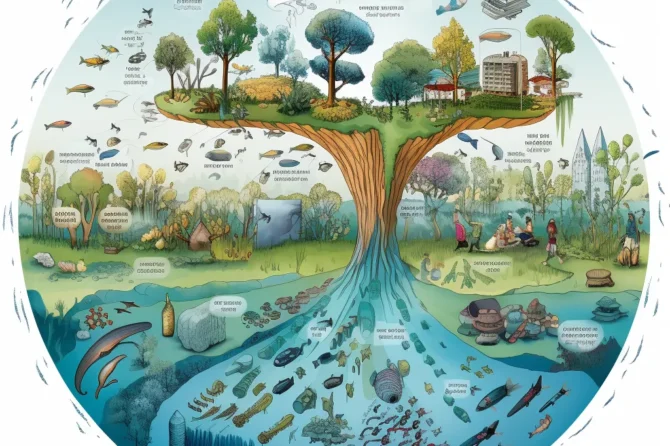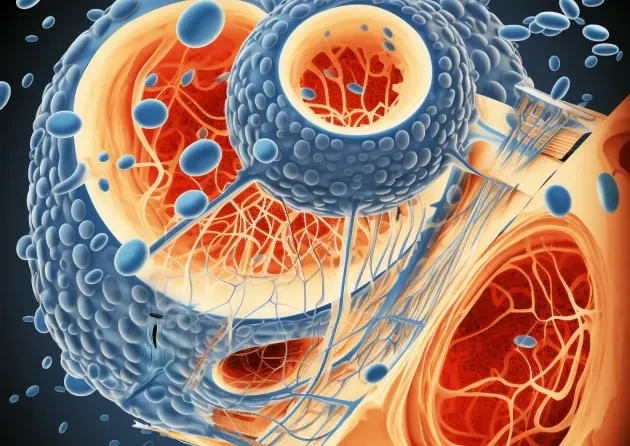Introduction:
In the era of big data and technological advancements, bioinformatics has emerged as a crucial and transformative field at the intersection of biology, computer science, and data analysis. It harnesses the power of computational tools and algorithms to interpret and derive meaningful insights from vast biological data sets, contributing to the advancement of precision medicine. With its ability to link biological data with information storage, distribution, and analysis, bioinformatics has become a cornerstone of scientific research, particularly in the field of biomedicine, enabling precision medicine to take center stage in healthcare.
Bioinformatics acts as a bridge that connects the data-rich realm of biology with the computational prowess of computer science and statistics, thereby facilitating precision medicine’s implementation and growth. Through sophisticated tools and methodologies, researchers can extract valuable information from complex biological data, uncovering hidden patterns and relationships that were once elusive, ultimately driving the application of precision medicine approaches to patient care.
In biomedicine, precision medicine is a central focus of bioinformatics, shaping research in genomics, proteomics, transcriptomics, metagenomics, and pharmacogenomics. By integrating bioinformatics with precision medicine, it facilitates DNA sequencing, genome assembly, annotation, and comparative genomics, providing insights into the structure and function of genes, genetic variations, and their implications for health and diseases. Additionally, bioinformatics aids in protein sequence analysis, predicting protein structure, modeling interactions, and identifying drug targets, thus propelling drug discovery efforts in the context of precision medicine.
Moreover, it allows the study of an organism’s RNA transcripts and identifies non-coding RNAs, deepening our understanding of gene regulation and cellular processes, all of which have direct relevance to precision medicine. In metagenomics, it analyzes genetic material from environmental samples, unraveling microbial communities’ diversity and ecological roles with applications in agriculture, bioremediation, and human health, presenting opportunities for precision medicine approaches to address health challenges.
As bioinformatics continues to advance, driven by technological innovations and growing data, it holds immense potential for accelerating scientific discoveries in the realm of precision medicine. The integration of bioinformatics with artificial intelligence, deep learning, and cloud computing promises to unlock new layers of biological complexity, propelling us towards a future where precision medicine is at the forefront of healthcare practices, resulting in improved human health and personalized treatment plans.
By embracing the interdisciplinary nature of bioinformatics and fostering collaborative efforts across scientific disciplines, we address global challenges related to human health, agriculture, and environmental sustainability with precision medicine as the guiding principle. The promise of bioinformatics lies in its capacity to unveil new horizons in scientific discovery and innovation, ushering in a brighter and healthier future for humanity, driven by precision medicine approaches that cater to individual needs and characteristics.
Bioinformatics:
Bioinformatics, at the crossroads of biology, computer science, statistics, and mathematics, has emerged as a transformative and indispensable field in modern scientific research, paving the way for precision medicine. The exponential growth of biological data generated through advanced technologies, such as genomics, proteomics, and metabolomics, has presented both opportunities and challenges in deciphering the complexities of life, driving the need for precision medicine.
At its core, bioinformatics is driven by the need to handle and analyze vast and diverse biological data sets, a fundamental aspect of precision medicine. The field encompasses the development and application of computational tools, algorithms, and databases that are tailored to process and extract meaningful insights from these data, enabling the application of precision medicine principles to healthcare.
With the seamless integration of various disciplines, bioinformatics empowers researchers to uncover hidden patterns, identify relationships, and extract valuable information that was once elusive, ultimately contributing to precision medicine advancements and scientific discovery.
In the realm of genomics, bioinformatics plays a pivotal role in DNA sequencing and assembly, gene annotation, and comparative genomics, all of which have significant implications for precision medicine. These powerful tools enable researchers to explore an organism’s complete set of genes, its genome, revealing crucial information about the genetic basis of traits, diseases, and evolutionary history, all of which form the foundation of precision medicine research.
Proteomics, focusing on the study of proteins, benefits significantly from bioinformatics methodologies, further enhancing precision medicine applications. By analyzing protein sequences, predicting their structures, and modeling protein-protein interactions, researchers gain insights into the intricate molecular machinery that governs cellular processes, contributing to our understanding of diseases and potential treatment strategies in precision medicine.
Transcriptomics, dealing with an organism’s RNA transcripts, provides a deeper understanding of gene expression and regulation, which is of paramount importance in precision medicine research. Bioinformatics facilitates the analysis of gene expression patterns, differential gene expression studies, and the identification of non-coding RNAs, unraveling the complex network of molecular interactions that dictate an organism’s development, health, and response to environmental changes, thus guiding precision medicine approaches.
Metagenomics, a field that explores genetic material from environmental samples, such as the human microbiome or soil, relies on bioinformatics to characterize and understand the vast diversity of microbial communities, an area with promising implications for precision medicine. This has far-reaching implications in various fields, including agriculture, bioremediation, and human health, revolutionizing our approach to environmental and microbial studies, ultimately contributing to precision medicine practices.
Furthermore, bioinformatics plays a crucial role in pharmacogenomics, where it integrates genetic and clinical data to understand how an individual’s genetic makeup influences their response to drugs, aligning with the principles of precision medicine. This knowledge enables personalized medicine, tailoring treatments based on a patient’s unique genetic profile, optimizing therapeutic outcomes, and minimizing adverse effects, thereby revolutionizing healthcare through precision medicine strategies.
Applications of Bioinformatics in Precision Medicine:
Genomics: Bioinformatics plays a vital role in genomics, which involves the study of an organism’s complete set of genes (genome). It helps in DNA sequencing, genome assembly, annotation, and comparative genomics, allowing researchers to understand the structure and function of genes, genetic variations, and their impact on health and diseases. Through genomics, bioinformatics has laid the foundation for personalized medicine, enabling tailored treatments based on an individual’s unique genetic makeup.
Proteomics: Proteomics focuses on studying the structure, function, and interactions of proteins within an organism. Bioinformatics tools aid in protein sequence analysis, predicting protein structure, modeling protein-protein interactions, and identifying potential drug targets. By deciphering the complexities of the proteome, bioinformatics has significantly advanced drug discovery, enabling the identification of specific protein targets for therapeutic interventions.
Transcriptomics: Transcriptomics involves the study of an organism’s entire set of RNA transcripts (transcriptome) produced by its genes. Bioinformatics facilitates gene expression analysis, differential gene expression studies, and the identification of non-coding RNAs, contributing to our understanding of gene regulation and cellular processes. The insights gained from transcriptomics have opened new avenues for disease biomarker discovery and the development of gene-based therapies.
Metagenomics: Metagenomics deals with the study of genetic material recovered directly from environmental samples, such as soil, water, and the human microbiome. Bioinformatics tools help in analyzing and characterizing the diverse microbial communities present in these samples, unraveling their ecological roles and potential applications in fields like agriculture, bioremediation, and human health. Metagenomics has facilitated groundbreaking discoveries, revealing the hidden diversity of microorganisms and their crucial role in maintaining ecosystem balance.
Pharmacogenomics: Bioinformatics assists in pharmacogenomic research, which aims to understand how an individual’s genetic makeup influences their response to drugs. By integrating genetic and clinical data, bioinformatics enables personalized medicine, optimizing drug selection and dosage based on an individual’s genetic profile. Pharmacogenomics has the potential to revolutionize healthcare, ensuring more effective and safer drug treatments tailored to each patient’s unique genetic traits.
Tools and Techniques in Bioinformatics:
Sequence Alignment: Bioinformatics tools employ algorithms to align and compare DNA, RNA, and protein sequences, enabling the identification of similarities, differences, and evolutionary relationships. Sequence alignment has proven invaluable in evolutionary studies and identifying conserved regions critical for protein function.

Data Mining: Bioinformatics incorporates data mining techniques to extract valuable information from vast biological databases, identifying hidden patterns and trends. By mining biological data, researchers can uncover novel associations and correlations, guiding further investigations.
Machine Learning: Machine learning algorithms are employed in bioinformatics to develop predictive models, classify data, and make accurate predictions based on large-scale biological datasets. Machine learning has enabled the development of computational tools that aid in disease diagnosis, drug discovery, and biomarker identification.
Network Analysis: Bioinformatics utilizes network analysis methods to understand the complex relationships between genes, proteins, and other biological entities, revealing functional modules and signaling pathways. Network analysis allows researchers to grasp the interconnectedness of biological systems and their roles in health and disease.
Advancements and Future Directions:
Bioinformatics, as a dynamic and ever-evolving field, is experiencing rapid progress driven by the confluence of multiple factors. Technological advancements have played a pivotal role in shaping the trajectory of bioinformatics, enabling scientists to explore biological data at an unprecedented scale and depth. High-throughput technologies, such as next-generation sequencing and mass spectrometry, have revolutionized data generation, producing vast amounts of genomic, transcriptomic, proteomic, and metabolomic information. This explosion of biological data presents both challenges and opportunities, as researchers seek innovative ways to manage, analyze, and interpret these complex datasets.
To meet the demands of processing and analyzing large-scale biological data, the integration of multi-omics approaches has become paramount. Integrative bioinformatics allows researchers to combine data from different omics levels, gaining a more comprehensive understanding of biological systems. By merging genomics, proteomics, and other omics data, scientists can derive holistic insights into complex biological processes, revealing intricate relationships and interactions between genes, proteins, and other biomolecules.
An exciting frontier in the realm of bioinformatics is the integration of cutting-edge technologies, such as artificial intelligence (AI) and deep learning. AI-powered algorithms excel at data analysis, pattern recognition, and predictive modeling, making them indispensable tools in the bioinformatics toolkit. These advanced AI techniques offer powerful ways to identify novel drug targets, predict drug-drug interactions, and design personalized treatment strategies. The application of AI in bioinformatics is advancing precision medicine, as it allows healthcare professionals to tailor therapies based on an individual’s unique genetic profile and disease characteristics.
Moreover, cloud computing has emerged as a game-changer in bioinformatics. Cloud-based platforms provide scalable and cost-effective solutions for data storage, sharing, and processing. Researchers and institutions can leverage the vast computational resources offered by cloud providers, democratizing access to high-performance computing and bioinformatics tools. This democratization of resources fosters collaboration, accelerates scientific discoveries, and paves the way for more extensive and inclusive research efforts.
The seamless synergy between bioinformatics and cutting-edge technologies promises to unravel new layers of biological complexity and transform various domains of life sciences. In the realm of disease diagnostics and treatments, bioinformatics aids in identifying disease biomarkers, enabling early detection and targeted therapies. The elucidation of disease mechanisms and molecular pathways through bioinformatics is crucial for developing novel therapeutics and repurposing existing drugs.
Beyond human health, bioinformatics is revolutionizing agricultural and environmental biotechnology. The analysis of plant and microbial genomes enhances crop breeding, leading to the development of more resilient and productive plant varieties. Furthermore, bioinformatics aids in understanding ecosystems, ecological interactions, and microbial communities, guiding efforts in environmental conservation and bioremediation.
Conclusion:
Bioinformatics has indeed revolutionized biological research by providing powerful tools and techniques to analyze and interpret complex biological data. Its significance extends far beyond traditional research boundaries, as it has become an indispensable field driving breakthroughs in genomics, proteomics, transcriptomics, metagenomics, and pharmacogenomics. The integration of multi-omics data and cutting-edge technologies, such as artificial intelligence and cloud computing, has propelled bioinformatics to the forefront of scientific exploration.
As bioinformatics continues to advance, it holds the key to unlocking even deeper insights into the intricacies of life sciences. By delving into the molecular underpinnings of diseases and understanding the interactions within complex biological systems, bioinformatics promises to pave the way for personalized medicine and improved human health. Through targeted therapies, early disease detection, and more accurate drug predictions, bioinformatics empowers healthcare professionals with the tools they need to deliver precision medicine to patients, ultimately enhancing treatment outcomes and quality of life.
Embracing the interdisciplinary nature of bioinformatics is crucial in addressing some of the most pressing global challenges related to human health, agriculture, and environmental sustainability. Collaborative efforts across scientific disciplines foster synergy and knowledge exchange, allowing researchers to tackle complex problems holistically. In agriculture, bioinformatics is revolutionizing crop breeding, increasing crop yields, and ensuring food security in the face of a growing population and changing climate. Additionally, in environmental sustainability, bioinformatics plays a critical role in understanding ecosystems, biodiversity, and the impact of human activities on the environment, guiding conservation efforts and promoting responsible resource management.
As we harness the immense potential of bioinformatics, we stand on the cusp of a new era in scientific discovery and innovation. The future holds exciting possibilities as we unravel the mysteries of life and apply our knowledge to improve human health and address global challenges. By investing in research and development in bioinformatics, we can accelerate progress and drive transformative change in various sectors, contributing to a healthier, more sustainable, and better-connected world.
In conclusion, the integration of bioinformatics with cutting-edge technologies, the interdisciplinary collaboration, and the pursuit of knowledge-driven solutions will define the future of scientific progress. As we embrace the power of bioinformatics, we embark on a journey of discovery that holds immense promise for advancing medicine, agriculture, and environmental conservation. With bioinformatics as our ally, we are equipped to overcome current challenges and shape a brighter, more prosperous future for humanity and our planet.
If you need more information on this article click on the following link. This link will provide more extensive information and elaborate on the topic.
Genomic.News is your ultimate source for curated news, articles, and updates on the fascinating world of genomics. Our platform brings together the latest scientific breakthroughs, research advancements, and industry developments in one centralized hub. Stay informed about the cutting-edge discoveries, transformative technologies, and ethical considerations driving the field of genomics. Explore the intersection of genetics and healthcare, agriculture, biotechnology, and beyond.





